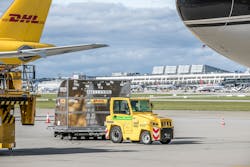Stuttgart Airport introduced four fully electric baggage and cargo tractors for fast, quiet and emission-free cargo handling. Just as powerful as diesel tow tractors, but up to 60 percent more economical, the SHERPA E tractors supplied by Goldhofer are now used to tow all air cargo to the required destination.
“In 2018 we first started using zero-emission battery-operated technology to handle passenger and baggage movements on the apron. We have now done the same in the cargo sector by replacing diesel-powered cargo tow tractors with the emission-free Goldhofer vehicles,” says Dr. Arina Freitag, Managing Director of Flughafen Stuttgart GmbH.
Goldhofer’s airport technology experts were closely involved in the planning, organization and installation of the necessary charging infrastructure.
“We are delighted that the power, efficiency and sustainability of our high-performance tow tractors are helping Stuttgart Airport to achieve its ambitious climate targets. At the same time, it motivates us to continue developing complete ground handling solutions based on sustainable technologies,” says Lothar Holder, CEO at Goldhofer AG and Head of Airport Technology.
In October, Stuttgart Airport moved one step closer to achieving its goal of carbon neutrality – by switching its fleet of cargo tow tractors to the Goldhofer SHERPA E. Fully electrically powered, the completely emission-free and low-noise models have replaced the diesel vehicles previously used. The decision was motivated by the improvements available with the new vehicles in terms of economics and operational efficiency plus Stuttgart Airport’s commitment to sustainability and environmentally friendly working, meaning energy savings and reductions in emissions and noise. This benefits all parties involved: Stuttgart Airport, the air cargo operators and the employees on the tarmac.
Continuous and Economical Operation – SHERPA E
Goldhofer’s electric tow tractors offer the same high levels of reliability, safety and flexibility as the diesel-powered versions, while energy savings can be as high as 80 percent. The highly efficient 400 V lithium-ion battery is designed for fast charging, and intermediate charging is also possible in even the shortest of breaks thanks to Goldhofer’s IonMaster technology. The result is 30 percent higher availability than with lead-acid batteries so that the SHERPA E can be operated almost continuously over several shifts. In addition, active temperature management ensures maximum battery service life. The zero-emission SHERPA E can be operated both indoors and outdoors. The vehicle comes with a choice of ballast weights and three cabin options. With these individual configurability options, the tow tractors can be customized to meet the specific requirements and operating conditions at any airport.
Powerful, Sustainable and Economical – IonMaster Technology
For trouble-free working with the SHERPA E, Goldhofer relies on its IonMaster system, a powerful electric drive based on high-voltage lithium-ion battery technology. As an efficient, modular long-life drive concept, IonMaster technology is the key to the highly economical use of the vehicles operated with a range of charging infrastructures. It ensures virtually permanent availability of the fleet, and the fleet itself can be reduced to a minimum number of vehicles as permitted by the individual airport situation.
Pioneering carbon neutrality
By replacing its diesel cargo tow tractors with Goldhofer’s electrically powered vehicles, Stuttgart Airport has reached another stage on the road to a full e-mobility fleet. As a member of the Airport Carbon Accreditation (ACA) climate protection initiative, Baden-Württemberg’s largest airport recently received certification for its carbon management program from ACI Europe, the umbrella association of European commercial airports, for the third consecutive time.



